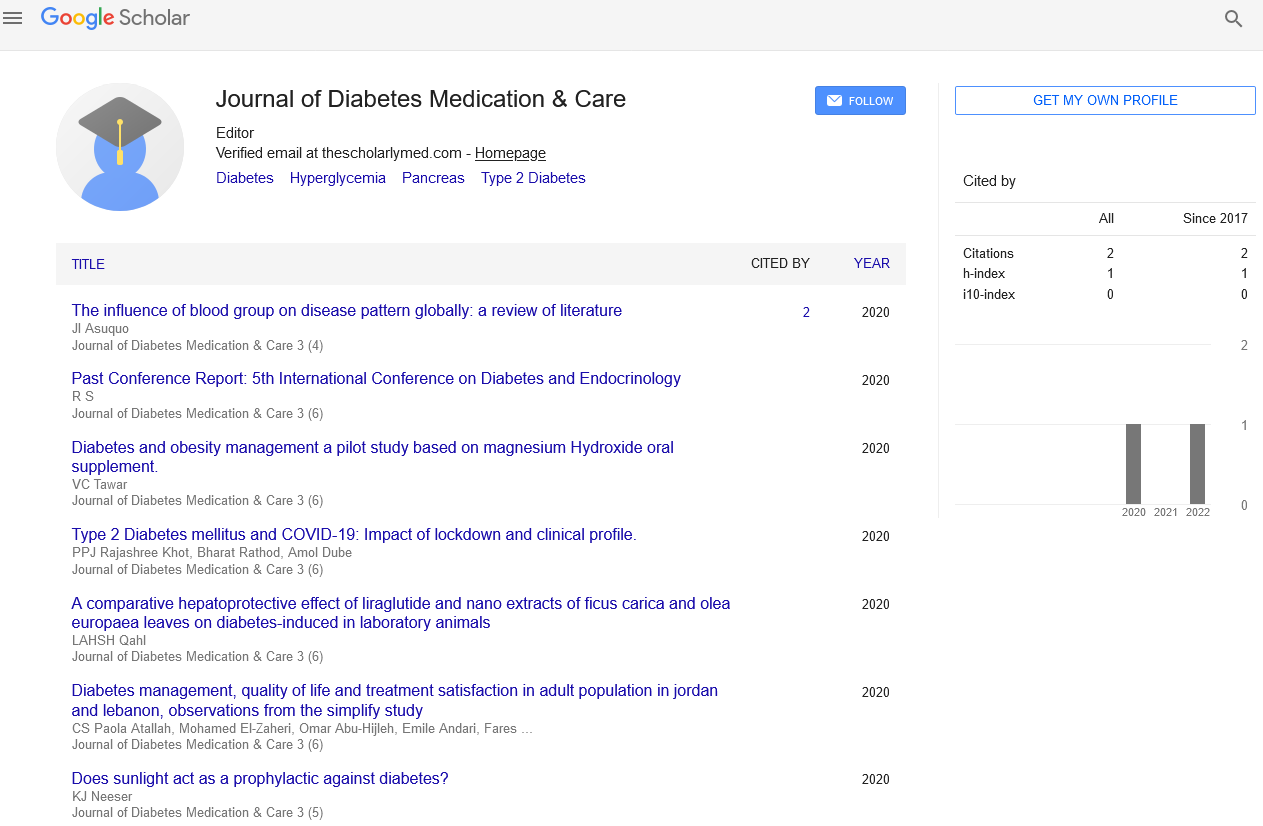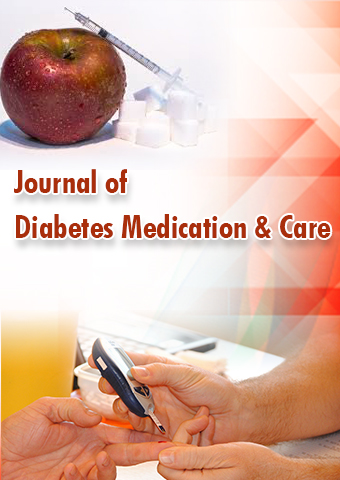Perspective - Journal of Diabetes Medication & Care (2024) Volume 7, Issue 5
Immunotherapy for Type 1 Diabetes: A New Frontier in Treatment
- Corresponding Author:
- Xiaoang Yaung
Department of Endocrinology, University of Havana, Havana, Bahrain
E-mail: Xiayaung@163.com
Received: 13-Sep-2024, Manuscript No. JDMC-24-148359; Editor assigned: 16-Sep-2024, PreQC No. JDMC-24-148359 (PQ); Reviewed: 30-Sep-2024, QC No. JDMC-24-148359; Revised: 21-Oct-2024, Manuscript No. JDMC-24-148359 (R); Published: 28-Oct-2024, DOI: 10.37532/JDMC.2024.7(5).272-274
Introduction
Type 1 Diabetes (T1D) is an autoimmune disease characterized by the destruction of insulin producing beta cells in the pancreas. Unlike type 2 diabetes, which is primarily related to insulin resistance and lifestyle factors, T1D is driven by an inappropriate immune response that targets and eliminates these crucial cells. As a result, individuals with T1D require lifelong insulin therapy to manage their blood glucose levels. However, emerging research in immunotherapy offers promising avenues for modifying or even halting the autoimmune process underlying T1D. This article explores the current landscape of immunotherapy for type 1 diabetes, examining its mechanisms, clinical trials, potential benefits, and challenges.
Description
Understanding type 1 diabetes and its immune mechanism
In type 1 diabetes, the immune system mistakenly attacks the beta cells of the pancreas, leading to insufficient insulin production. This autoimmune response is thought to be triggered by a combination of genetic predisposition and environmental factors, such as viral infections. The resulting lack of insulin causes hyperglycemia and can lead to severe complications, including ketoacidosis, cardiovascular disease, and neuropathy.
Immunotherapy aims to modulate or restore immune function to prevent the destruction of beta cells. By targeting the autoimmune response, researchers hope to preserve residual insulin production and improve metabolic control, potentially altering the course of the disease.
Types of immunotherapy approaches
Immune modulation: Immune modulation refers to therapies that adjust the immune system’s response without completely suppressing it. This approach aims to maintain the body’s ability to fight infections while reducing the autoimmune attack on beta cells.
Anti-CD3 therapy: One of the most studied immune modulating therapies is anti-CD3 monoclonal antibodies, such as teplizumab. This treatment targets the CD3 molecule on T cells, which play a crucial role in the autoimmune response. Clinical trials have shown that teplizumab can delay the onset of T1D in at-risk individuals by preserving beta cell function.
Anti-IL-1 therapy: Interleukin-1 (IL-1) is a pro-inflammatory cytokine involved in the immune response. Therapies targeting IL-1, such as anakinra, have shown promise in reducing inflammation and preserving beta cell function. Clinical studies are ongoing to evaluate its efficacy in newly diagnosed patients.
Vaccination strategies: Vaccination strategies aim to induce tolerance to specific autoantigens involved in T1D. By training the immune system to recognize these antigens as harmless, researchers hope to prevent the autoimmune attack on beta cells.
DiaPep277: This peptide based vaccine is designed to promote immune tolerance to insulin-producing cells. Clinical trials have indicated that DiaPep277 can prolong insulin independence in newly diagnosed T1D patients, offering a potential disease-modifying treatment.
Stem cell therapy: Stem cell therapy involves the use of stem cells to regenerate or repair damaged tissues, including the beta cells in the pancreas. This approach has the potential not only to restore insulin production but also to address the underlying autoimmune response.
Hematopoietic Stem Cell Transplantation (HSCT): HSCT involves the infusion of hematopoietic stem cells, which can reconstitute the immune system and potentially halt the autoimmune attack. While this approach has shown success in select patients, it carries significant risks and is not widely applicable.
Combination therapies: Combining different immunotherapeutic approaches may enhance efficacy and safety. Researchers are exploring the synergistic effects of various therapies, such as combining anti-CD3 therapy with vaccination strategies or other immune modulators. These combination therapies may offer a more comprehensive approach to managing T1D.
Clinical trials and research findings
Numerous clinical trials are underway to evaluate the safety and efficacy of immunotherapies for type 1 diabetes. Some notable findings include:
Teplizumab: A landmark study published in The New England Journal of Medicine demonstrated that teplizumab could delay the onset of T1D in high risk individuals by about two years. The FDA approved teplizumab for use in 2022, marking a significant milestone in the treatment of T1D.
Anakinra: Clinical trials assessing the use of anakinra have shown promising results in preserving beta cell function in newly diagnosed patients. Participants demonstrated improved glycemic control and reduced insulin requirements.
DiaPep277: Trials of this peptide vaccine indicated that it could prolong insulin independence and improve metabolic control in patients with recentonset T1D.
These findings underscore the potential of immunotherapy to modify the disease course in type 1 diabetes.
Benefits of immunotherapy for type 1 diabetes
The potential benefits of immunotherapy for individuals with T1D are substantial:
Disease modification: Immunotherapies aim to halt or slow the autoimmune process, preserving beta cell function and potentially reducing the need for insulin therapy.
Improved quality of life: By stabilizing blood glucose levels and reducing the burden of daily insulin administration, immunotherapy can enhance the overall quality of life for individuals with T1D.
Long term remission: Some therapies may lead to extended periods of insulin independence or reduced insulin requirements, offering patients a reprieve from the constant management of their condition.
Personalized medicine: Immunotherapy represents a move toward personalized treatment approaches, allowing for tailored therapies based on an individual’s immune profile and disease characteristics.
Challenges and limitations
Despite the promising developments in immunotherapy for type 1 diabetes, several challenges remain:
Safety concerns: Modulating the immune system carries risks, including the potential for increased susceptibility to infections or the development of other autoimmune conditions.
Variability in response: Individual responses to immunotherapies can vary widely, making it challenging to predict treatment outcomes. Factors such as genetics, disease stage, and overall health can influence efficacy.
Long term effects: The long term safety and efficacy of many immunotherapeutic approaches are still under investigation. Understanding the duration of response and potential adverse effects is crucial for patient safety.
Accessibility: While some immunotherapies show great promise, their accessibility and affordability can be barriers to widespread adoption. Efforts must be made to ensure that these treatments are available to those who need them.
Future directions
The field of immunotherapy for type 1 diabetes is rapidly evolving, with several exciting directions for future research:
Novel therapeutics: Continued exploration of new immune modulating agents, vaccines, and combination therapies holds the potential for more effective treatments.
Biomarker identification: Identifying biomarkers that predict response to immunotherapy can help tailor treatments to individual patients, enhancing outcomes.
Gene therapy: Advances in gene therapy may offer new avenues for treating T1D by targeting the underlying genetic and immunological factors that contribute to the disease.
Patient-centered research: Engaging patients in the research process and considering their perspectives can help shape the development of therapies that meet their needs.
Conclusion
Immunotherapy represents a promising frontier in the treatment of type 1 diabetes, with the potential to modify the disease course and improve the quality of life for millions. As research continues to advance, the hope is that innovative therapies will not only halt the autoimmune attack on beta cells but also restore insulin production and metabolic control. While challenges remain, the ongoing exploration of immunotherapy offers a beacon of hope for individuals living with this complex autoimmune condition, paving the way for a future where type 1 diabetes can be effectively managed or even cured.

